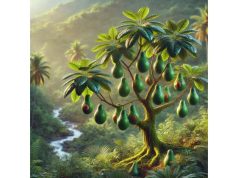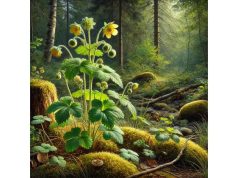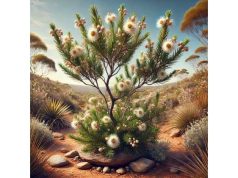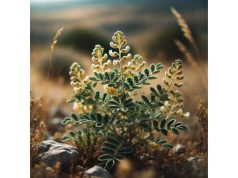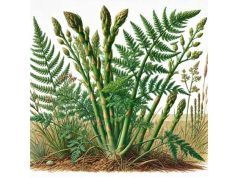Althaea is a genus of flowering plants from the mallow family (Malvaceae), revered most famously through Althaea officinalis, also known as the “marshmallow plant.” For centuries, Althaea species have graced marshy meadows and streamsides across Europe, Western Asia, and parts of North Africa. Characterized by soft, velvety leaves and pastel blossoms—ranging from pinkish-white to pale lavender—these perennials stand out for their thick, mucilaginous roots. Traditionally, various cultures harnessed those roots, leaves, and flowers in soothing poultices, teas, and confections. Indeed, the original marshmallows trace their lineage to ancient sweet treats made by blending Althaea’s sticky root sap with honey or sugar. Over time, scientific interest in Althaea’s polysaccharides, flavonoids, and other phytochemicals has only reinforced its role in calming irritated tissues, especially for respiratory or digestive complaints.
Across folk medicine, Althaea has garnered a loyal following for gently easing coughs, sore throats, and digestive upsets. Modern herbal formulas frequently rely on the plant’s demulcent qualities—attributed to its mucilage—for enveloping mucous membranes with a protective barrier. Outside the health sphere, home gardeners prize marshmallow plants for their ornamental pastel blossoms, while pollinators relish the ample nectar. With a heritage spanning Greek, Roman, and Middle Eastern traditions, Althaea continues to thrive in the hearts (and gardens) of herbal enthusiasts, bridging the gap between antiquity’s gentle remedies and contemporary scientific validation.
- Soothing demulcent properties beneficial for throat and digestive relief
- Rich mucilage that forms a protective barrier on irritated tissues
- Historical use in confections, inspiring the modern “marshmallow” treat
- Mild anti-inflammatory and antioxidant effects from flavonoids
- Ornamental value, providing pastel blossoms and nectar for pollinators
Table of Contents
- Althaea: Key Botanical Traits and Distinctive Features
- Althaea: Cultural Roots and Historical Significance
- Althaea: Noteworthy Chemical Constituents
- Althaea: Major Health Advantages and Essential Qualities
- Althaea: Practical Usages, Precautions, and Safe Approaches
- Althaea: Key Research Highlights and Modern Scientific Findings
- Althaea: Frequently Asked Questions
Althaea: Key Botanical Traits and Distinctive Features
Plant Family and Species
Althaea belongs to the Malvaceae family, which also includes hollyhocks, okra, and hibiscus. While “Althaea” refers to the broader genus, Althaea officinalis is the central species in herbal medicine. Additional species in the genus might be used ornamentally or in localized folk remedies, but A. officinalis reigns supreme for well-documented health uses.
- Taxonomic Identity
- Genus: Althaea
- Family: Malvaceae
- Common name for A. officinalis: Marshmallow, mallards, or sweet weed.
- Native Habitat
- Predominantly found in damp, maritime regions of Europe, North Africa, and Western Asia. Prefers moist, loamy soil with good drainage—often near marshes, riverbanks, or wetlands.
Physical Appearance
- Height and Growth Pattern
- Mature plants typically range 60–120 cm (2–4 ft) tall. Some can approach 1.5 meters or more under ideal conditions.
- Growth habit is erect with branching that fosters a bushy or clumping form.
- Leaves
- Soft, greyish-green, and velvety to the touch, with a slightly heart-shaped or triangular outline.
- Finely serrated edges or lobes, typically 3–5 parted, covered in minute hairs that produce a “fuzzy” feel.
- Flowers
- Typically appear pale pink to white, about 2–3 cm in diameter.
- The center often bears a subtle maroon tinge, with the petals forming a gentle funnel typical of the Malvaceae.
- Blooming often occurs in mid to late summer, attracting pollinators like bees and butterflies.
- Roots
- Thick, fleshy, and rich in mucilage, historically used for confections and medicinal extracts.
- Harvest usually occurs after the second or third year for maximum mucilage content.
Cultivation and Propagation
- Soil Preferences
- Thrives in well-drained but consistently moist, fertile soils.
- pH can be slightly acidic to neutral. Incorporating organic matter ensures healthy, robust growth.
- Sunlight and Water
- Full sun or partial shade is acceptable. Adequate water is crucial, especially during flowering, as dryness can stunt yield of leaves and flowers.
- Overwatering or soggy soil, however, might cause root rot.
- Propagation Methods
- Often started from seeds in early spring. Stratification may enhance germination rates.
- Root divisions are possible for established clumps—less common but feasible.
Ornamental and Ecological Value
- Cottage Garden Charm
- Marshmallow plants complement herb gardens and naturalistic flower beds. The pastel blooms add a soft, romantic aesthetic.
- Pollinator Support
- Like many Malvaceae members, Althaea’s open-faced flowers serve as feeding stations for bees, butterflies, and beneficial insects.
Thus, Althaea’s morphological hallmarks—fuzzy leaves, subtle pastel blooms, and substantial mucilage-rich roots—intertwine to form a plant both aesthetically pleasing and historically revered for its gentle but potent herbal contributions.
Althaea: Cultural Roots and Historical Significance
Antiquity and Early Medicinal Beginnings
- Egyptian Confection Origins
- Historical texts suggest Egyptians first combined Althaea root sap with honey or nuts to create sweet treats akin to today’s marshmallows.
- This practice was less about candy for children, more a delicacy in religious or royal contexts.
- Greek and Roman Empires
- The genus name “Althaea” stems from the Greek word “althainein,” meaning “to cure” or “heal,” illustrating how the plant was seen as a panacea for irritations.
- Roman naturalists like Pliny the Elder documented Althaea’s usage to ease coughs, referencing the soothing effect of the root’s mucilage.
Influence in Traditional Western Herbalism
- Medieval Apothecaries
- Marshmallow root emerged as a staple in monastic infirmaries, recommended for catarrh, chest congestion, and inflamed mucosal tissues.
- Formulations such as sweet syrups, lozenges, or pottages featured in medieval recipes, bridging palliative relief and nourishment.
- Renaissance and Early Modern Period
- Herbal luminaries (e.g., Gerard, Culpeper) praised Althaea for “cooling and moistening” inflamed tissues, specifically in the throat and GI tract.
- Sweets from Althaea root gained popularity in 18th-century France, culminating in the refined “pâte de guimauve,” the forerunner to modern marshmallows. By the 19th century, gelatin replaced the root sap in commercial recipes.
Beyond Europe: Middle Eastern and African Traditions
- Egypt and Surrounding Regions
- Marshmallow root as a throat soother predates Greek adoption. Local folk medicine used the entire plant (root, leaves, flowers) for various ailments.
- In certain desert cultures, the succulent aspect provided moisture or mild nourishment during times of scarcity.
Modern Day Rediscovery
- Industrial Era Replacements
- As sugar-candy processes industrialized, the use of actual Althaea root in confections waned, replaced by synthetic thickeners or gelatin.
- Meanwhile, pharmacies continued offering “Marshmallow Syrup” or “Marshmallow Root Extract” for cough or GI relief, overshadowed by newly emerging pharmaceuticals.
- Contemporary Herbal Revival
- The resurgence in holistic and organic living has revived interest in Althaea officinalis. Demand soared for dried root in herbal blends, powder for homemade cough syrups, and seeds for home horticulture.
- Alternative health communities champion Althaea as a “safe, gentle, and time-tested botanical,” bridging ancient healing with scientific acceptance.
From ancient sweet delicacies to a mainstay in medieval medical texts, Althaea’s cultural trajectory exemplifies how an herb can transition from revered healing staple to sweet treat, and ultimately reemerge in modern integrative wellness. Its presence in both culinary folklore and medical tradition cements Althaea’s storied place across civilizations.
Althaea: Noteworthy Chemical Constituents
Althaea’s reputation as a demulcent and soothing herb hinges on its high mucilage content—an array of polysaccharides that form a gel-like substance when hydrated. Beyond mucilage, the plant boasts several active compounds relevant to its mild therapeutic potential.
Mucilage and Polysaccharides
- Primary Component:
- Mucilage content can represent up to 25–35% of the root’s dry weight in well-grown A. officinalis.
- Polysaccharides, including pectins and glucans, yield a slick, gelled texture that coats irritated tissues.
- Function:
- Creates a protective film on mucous membranes, calming inflammation in throats, GI tracts, or external skin surfaces.
Flavonoids and Phenolic Acids
- Flavones (Apigenin, Luteolin):
- Offer antioxidant and possible anti-inflammatory functions.
- Contribute subtle flavors or color, overshadowed by the robust mucilage presence.
- Coumarins and Caffeic Acid Derivatives:
- Some references note minor coumarins with mild vasodilation or anti-edematous influences.
- Caffeic acid variants supply moderate free-radical scavenging capacity.
Amino Acids and Pectins
- Minor Protein and Pectin Content:
- While not a major protein source, the root may contain small amounts of asparagine or related amino acids.
- Pectins amplify the demulcent, thickening effect, beneficial in cough syrups or soothing lozenges.
Trace Vitamins and Minerals
- Limited Nutrient Profile:
- The root offers small amounts of vitamin A, C, and some B vitamins, though overshadowed by its medicinal usage.
- Minerals like calcium and magnesium appear in modest quantities. Rarely used for nutritional supplementation alone.
Essential Oil and Volatile Compounds
- Minimal Volatile Profile:
- Unlike aromatic herbs (lavender, rosemary), Althaea’s fragrance is faint. The plant’s potency lies in its water-soluble mucilage rather than essential oils.
Inulin or FOS (Potential)
- Prebiotic-like Components:
- Some texts mention inulin or fructo-oligosaccharides in the root. If present, they might enhance gut flora balance, though overshadowed by primary polysaccharides.
Active Intersection of Mucilage with Tannins or Saponins
- Tannins (Small Amounts):
- Tannins can add mild astringency, beneficial in synergy with mucilage for tightening mucosal tissues while also lubricating them.
- Saponins (If Present):
- In some cultivars, saponins have been noted, but not as prominent as in other Malvaceae relatives. They can assist absorption or lend mild anti-inflammatory aspects.
Extraction and Preservation
- Water-Based Infusions:
- Optimal method for releasing the mucilage content is steeping or cold infusion. Prolonged steeping draws out the gel-like substance.
- Ethanol or Tinctures:
- Alcohol extraction yields fewer polysaccharides (as mucilage is water-soluble), focusing more on flavonoids or minor phenolics.
- Powder vs. Fresh:
- Powdered root is convenient but may lose some potency if stored poorly. Fresh root or recent harvest typically holds maximum mucilage.
Thus, Althaea’s chemical identity is dominated by its thick mucilage matrix, supplemented by minor flavonoids, coumarins, and phenolics. This synergy underpins its gentle, soothing reputation—a chemical testament to how a simple, mild herb can have outsized effects on irritated tissues when harnessed effectively.
Althaea: Major Health Advantages and Essential Qualities
Long hailed as a gentle yet robust herbal ally, Althaea’s demulcent character remains the cornerstone of its healing impetus. Below are the key areas where Althaea’s mild approach may be especially beneficial.
1. Soothing Respiratory Support
- Cough and Throat Relief:
- Althaea root’s mucilage coats the throat, reducing irritation and easing dryness or minor inflammation.
- In synergy with honey or lemon, it forms a classic herbal remedy for mild cough or scratchy throats, often favored in children’s cough syrups.
- Bronchial Irritation:
- The herb’s moistening effect can help calm the upper respiratory tract, alleviating that “tickling” dryness.
- Typically combined with other expectorants (like licorice or thyme) for deeper chest congestion.
2. Digestive and Gut Benefits
- Inflammatory Bowel Soother:
- Some IBS or colitis sufferers find partial relief from Althaea teas or capsules, with mucilage providing a protective, less abrasive environment.
- Potential to reduce mild diarrhea or constipation by normalizing bowel moisture—though each case is unique.
- Reflux and Heartburn:
- A thick mucilaginous layer can reduce acid contact with esophageal lining, though not a cure for severe GERD.
- Beneficial as part of broader dietary adjustments.
3. Skin-Calming and Topical Uses
- Dry, Irritated Skin:
- Althaea-infused creams or salves can help lock in moisture, soothe flakiness, or calm itching.
- Great for mild dermatitis, windburn, or after-sun dryness.
- Minor Burns or Scrapes:
- Traditional poultices used softened or macerated leaves or roots to lay over burns, forming a protective film.
4. Anti-Inflammatory and Wound-Healing Effects
- Inflammation Moderation:
- Lab research suggests Althaea’s flavonoids or coumarins might reduce localized swelling or redness.
- Coupled with the protective gel, fosters a conducive environment for tissue repair.
5. Oral and Dental Health
- Mouth Rinses or Lozenge:
- Some herbal formulas incorporate Althaea for soothing inflamed gums or mouth ulcers.
- Mucilage can keep oral tissues hydrated, though overshadowed by more potent astringents like sage or thyme in rigorous mouthwash solutions.
6. Immune System and Overall Resilience
- Non-Specific Immune Boost:
- Althaea’s gentle approach might promote overall defense by keeping mucosal barriers healthy.
- Not typically recognized as an overt immune stimulant, more of an indirect supportive herb.
7. Culinary and Nutritional Subtleties
- Marshmallow Confection Inspiration:
- Historically, Althaea root was simmered with sweeteners to craft a medicinal sweet. While modern “marshmallows” seldom contain it, some artisanal producers return to the root-based tradition.
- Light Nutrient Content:
- Leaves or young shoots can be added to salads, offering mild taste and texture, though overshadowed by its medical role.
Combining Althaea with Other Herbs
- Synergy in Formulations:
- Often blended with warming herbs (ginger, cinnamon) for GI synergy or cooling allies (peppermint, licorice) for respiratory needs.
- Balancing Effects:
- If dryness is a hallmark of a condition (like a dry cough), Althaea’s moistening property excels. For damp or congested states, pairing with mild diuretics or expectorants fosters balance.
In conclusion, Althaea stands out as a demulcent champion, gently relieving dryness or irritation in mucous membranes. Its broad but subtle potency suits a variety of complaints, from coughs to minor GI troubles. Coupled with other supportive herbs, it offers a stable foundation in daily or acute herbal protocols, epitomizing gentle, nurturing botanical healing.
Althaea: Practical Usages, Precautions, and Safe Approaches
Everyday Home Preparations
- Infusions or Teas:
- Root-based: Traditional method calls for a cold infusion (4–8 hours) to maximize mucilage extraction. Strain, gently warm if desired, and sip for throat or tummy relief.
- Leaf-based: Hot infusion is feasible, though leaves contain less mucilage than roots, typically used for mild respiratory or skincare rinses.
- Syrups and Lozenges:
- Homemade syrups blend Althaea root decoction with honey, glycerin, or sugar, forming a thick remedy for cough or irritated throat.
- Herbal lozenges can be shaped by mixing thickened root extract with sweeteners or thickening agents.
- Topical Poultices and Creams:
- Mash softened root or leaf with water or hydrosol, then apply to minor skin irritations or dryness.
- In the cosmetic sphere, Althaea root extract occasionally appears in gentle lotions or baby products as a moisturizing agent.
Commercial Products and Supplements
- Powdered Root Capsules:
- Offer measured convenience. Typically 400–500 mg capsules, taken with water.
- Best for GI or mild respiratory support, though ensuring product quality (no adulterants) is key.
- Liquid Extracts / Tinctures:
- Alcohol-based tinctures can hamper mucilage extraction. Some manufacturers produce glycerin-based extracts to maintain the demulcent effect.
- Follow label instructions, or confirm dosage with a trained herbalist.
- Skincare Lines:
- Soothing lotions, face masks, or bath additions highlight Althaea’s humectant and calming properties.
- Check ingredient lists—authentic “marshmallow root” extract or “Althaea officinalis” labeling ensures presence of actual herb.
Safety and Potential Interactions
- General Safety Profile:
- Largely safe for the vast majority, with minimal side effects. Some individuals might experience mild digestive upset if overconsumed.
- Allergies or Hypersensitivity:
- Rare, but possible. Patch test for topical products or start with small internal doses.
- Drug Absorption:
- The mucilaginous coating might slow absorption of concurrent oral medications. Space by an hour or two, especially for critical meds.
- Pregnancy and Lactation:
- Typically considered benign in moderate usage for pregnant or nursing mothers. Nonetheless, best to consult a healthcare professional for dosage guidance.
Harvesting and Storage
- Root Harvest:
- Often recommended after the second year in fall, when carbohydrate content is higher.
- Clean thoroughly and cut into small pieces for drying in a warm, well-ventilated space.
- Leaf Collection:
- Best done in early flowering stage for optimum potency.
- Leaves can be used fresh or dried in a single layer, stored in airtight jars out of direct sunlight.
Combining with Other Herbs
- Respiratory Allies:
- Marshmallow root synergy with thyme, licorice, or mullein for robust cough-relief blends.
- Digestive Combinations:
- Pair with ginger or fennel to counter excessive dampness or gas, balancing mucilage with gentle warmth.
Who Might Benefit?
- Individuals with Chronic Dry Cough or Throat Irritation
- Teachers, singers, or those exposed to dryness can keep a mug of Althaea tea at hand.
- Sensitive Digestive Systems
- IBS or mild ulcerative cases might find it soothing, complementing diets and medical treatments.
- Topical Relief Seekers
- Dry or sensitive skin types often appreciate the gentle hydration offered by Althaea-based creams.
By embracing these safe usage guidelines and synergy strategies, Althaea’s demulcent, protective essence can be harnessed effectively. While side effects are rare, mindful dosing, especially around pharmaceuticals, helps maintain beneficial harmony.
Althaea: Key Research Highlights and Modern Scientific Findings
Though overshadowed by popular “star” herbs, Althaea has been the subject of selected studies—particularly focusing on its demulcent nature and potential anti-inflammatory or antimicrobial actions.
1. Antitussive and Demulcent Efficacy
- Study (2012), Journal of Ethnopharmacology:
Investigated Althaea officinalis root extract in rodents with induced cough reflex. Found significantly reduced cough frequency, attributed to mucilage forming a protective barrier on the respiratory lining. Recommended further clinical trials on humans for verifying long-term safety and dosage.
2. Anti-Inflammatory and Wound Healing
- Paper (2016), Evidence-Based Complementary and Alternative Medicine:
Examined topical application of an Althaea-based gel on induced skin inflammation in mice. Showed moderate reduction in redness and swelling, consistent with earlier anecdotal claims. Authors hypothesized synergy between polysaccharides and minor flavonoids in tissue repair.
3. Gastroprotective Actions
- Research (2018), BMC Complementary Medicine and Therapies:
Explored protective effects of Althaea root extract on artificially induced gastric ulcers in a rat model. The plant’s mucilage formed a barrier, decreasing ulcer severity. While beneficial, the study advocated for further trials to fully understand long-term GI support.
4. Immunomodulatory Potential
- Investigations (2020), Pharmacognosy Research:
Showed mild enhancement of phagocytic activity in immuno-challenged murine subjects given Althaea extracts. Nonetheless, direct extrapolation to humans remains uncertain. The authors caution about possible interfering factors (diet, stress).
5. Historical Culinary and Cultural Impact
- Culinary Ethnography (2021), Food and Culture Journal:
Documented usage of marshmallow root in Middle Eastern confections, bridging traditional sweets with mild healing connotations. Survey data suggested revived interest among artisanal confectioners, though overshadowed by commercial marshmallows that rarely use the real root.
Althaea: Frequently Asked Questions
Is Althaea the same as the marshmallow we eat?
The modern “marshmallow” candy is generally made from sugar, gelatin, and flavorings, without real Althaea root. Historically, confections used Althaea’s root sap. A handful of artisanal sweets still incorporate actual marshmallow root, but commercial marshmallows rarely do.
Can I use Althaea if I’m pregnant?
Althaea is often considered safe in moderation, particularly for its mild approach. However, formal studies on pregnant individuals are limited. Always discuss herbal use, including Althaea teas or supplements, with a qualified healthcare provider during pregnancy.
How do I prepare Althaea root tea for a sore throat?
For maximum demulcent effect, try a cold infusion. Soak 1–2 tablespoons of dried, chopped root in a mug of cool water for several hours or overnight. Strain, gently warm if desired, and sip. This helps preserve mucilage. You can add honey or lemon to taste.
Does Althaea have any side effects?
Most people tolerate Althaea well. Mild stomach upset or diarrhea can occur if overconsumed. Rare allergies may manifest in rashes or itching. If taking medications, note that Althaea’s mucilage may slow drug absorption—space doses by at least an hour.
Disclaimer:
The content in this article is for educational purposes only and should not replace professional medical advice. Always consult a qualified healthcare professional before incorporating new herbs into your wellness routine.
If you found this Althaea article helpful, please consider sharing it on Facebook, X (formerly Twitter), or whichever social media platform you prefer. Helping more people discover the gentle wonders of this historic herb fosters broader appreciation and responsible usage!


